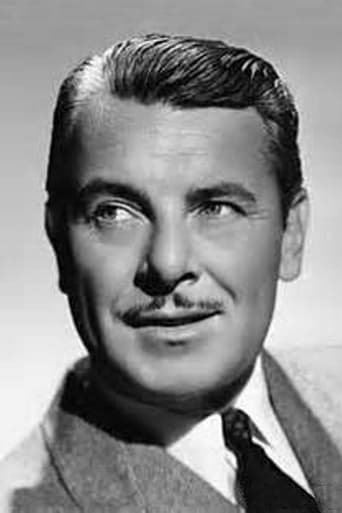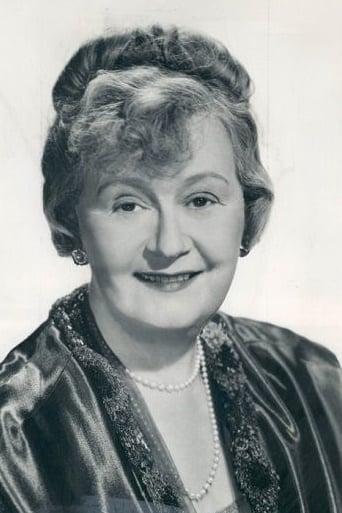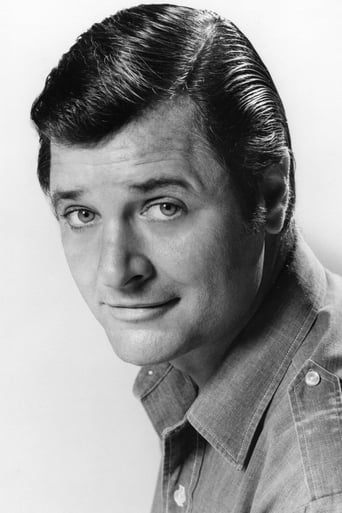WasAnnon
Slow pace in the most part of the movie.
SnoReptilePlenty
Memorable, crazy movie
Nessieldwi
Very interesting film. Was caught on the premise when seeing the trailer but unsure as to what the outcome would be for the showing. As it turns out, it was a very good film.
Robert Joyner
The plot isn't so bad, but the pace of storytelling is too slow which makes people bored. Certain moments are so obvious and unnecessary for the main plot. I would've fast-forwarded those moments if it was an online streaming. The ending looks like implying a sequel, not sure if this movie will get one
oldcorpsed
I LOVE this movie! I first saw it on TV in the early 50's when I was about 10 and bawled at the end, but with the kind of tears that make you feel good to have a human heart. I'm now 72 and its effect and my opinion have not changed. The plot's has been covered many times in these reviews, so I'll not go there, but the scene (knowing what we know) between Colbert and Welles when he tells her that what she has is the reality, is a heart-breaker with its loving generosity and sacrifice. Finally, when Welles comes in from the storm and is at the fireplace, full tears flow. And I'm not ashamed to admit it.Years later I actually did fall in love with Natalie Wood.
jarrodmcdonald-1
TOMORROW IS FOREVER is a film I first watched about ten years ago when I was living in Southern California. I found it on VHS one day at the West Hollywood library. At the time I was on an Orson Welles kick and was interested in looking at films where he played lead roles but did not direct. However, in retrospect, I'd say it has many Wellesian touches, meaning he probably provided director Irving Pichel with suggestions, as was his custom on sets where he was not technically in charge. But even with Welles at the center of what can be termed a bittersweet wartime melodrama, this picture is a team effort, and it boasts a remarkable cast. It was made shortly after Claudette Colbert had left her home studio Paramount to freelance. At this point, she was not afraid to take on more maternal roles, and in this production she plays teenager Richard Long's mother. Meanwhile, George Brent was at a phase in his career where he had left his home studio, Warner Brothers, and was eager to stretch himself in more substantive dramatic parts. This is one of the rare times when he played a father on screen, and added to that is the fact he is playing a middle-aged character, with slightly graying hair. And we mustn't overlook the contributions of veteran character actress Lucile Watson as well as child star Natalie Wood, who appears in one of her very first movies as a war orphan.The story, which seems to mirror war-time anxieties, plays out like a version of Enoch Arden. For those not familiar with the Enoch Arden theme, it's a contemporary reworking of Homer's Ullyses, where a man comes home from the war to learn his wife has believed him to be dead. In this case, Colbert is the spouse who has moved on with a new husband (Brent). Of course, Welles' character did not really die, and he returns to town in disguise. And while it seems gimmicky in spots, the dramatic intensity and heartbreak with which Welles and Colbert infuse their scenes makes this picture riveting and must-see. In particular, there is a point in the narrative where Colbert is beginning to put the pieces together that Welles might be her long-dead husband, and they share a very intriguing and poignant exchange at the old house they lived in as a newlywed couple. These emotions are revisited again when their son (Long) is going off to war, and Welles all but confirms his true identity to her.Of course, because this is a story about sacrifice and moving forward (directly relating to what moviegoers were dealing with at the close of the Second World War), we do not get the requisite happy ending. Instead, we get an ending filled with hope and new possibilities. We are able to realize these people have changed because of the war, and in so many ways now the home front is not what it once was. And as the picture comes to its mostly satisfying conclusion, we walk away from it wiser and a bit more in touch with our own strengths as human beings.
bkoganbing
Tomorrow Is Forever finds Orson Welles and Claudette Colbert as a pair of young marrieds during World War I when Orson announces he's enlisted in the American Expeditionary Force. The young wife sees her gallant young husband off to war, not knowing that she's pregnant. When he's reported missing in action, Claudette's all at sea. Fortunately she's got a most sympathetic boss who has an eye for her in any event. Claudette marries George Brent and they raise the son she has by Welles and they also have a son of their own.Although as the romantic young husband John MacDonald, Welles doesn't quite cut it, as Erik Kessler, the German refugee who in reality is John MacDonald, Welles just shines. With a heavy beard, makeup, a German accent and a shambling gait courtesy of the last war, Welles totally succeeds in recreating himself on the screen. He's so totally different you can't blame Claudette for not recognizing him, I could barely. On the eve of World War II, Brent who is now a big time industrialist meets Welles who is now in his Kessler persona. He brings him home and while there's something eerily familiar to Claudette he becomes an adjunct family member.Watching Tomorrow Is Forever I have no doubt that director Irving Pichel gave Welles total command of his character. Most likely Welles even directed some of the scenes he was involved with.Orson Welles throughout his life appeared in a lot of garbage using his actor's salary to continue financing his own projects. Though he's a bit weak as the young husband, as the old refugee chemist it's a brilliant characterization. Orson gets good support from Claudette Colbert, George Brent and the rest of the cast.Too bad he didn't get to do the whole film, direct as well as act.
krdement
I am stunned to see the vast majority of commentators describe this great film as "typical," "sentimental," and "melodramatic." That is to completely overlook the various philosophical and psychological aspects of the movie. Isolationism. Pacifism. Opposition to global hegemony and tyranny. All of these are at the essence of the dialog and the story. The need for humans to deny the temptation to live in the past and to embrace the future is the core of the movie - in addition to its TITLE. Reason must overcome emotionalism.That is made especially apparent in the scene where Kessler (Orson Welles) implicitly compares Mrs. Hamilton (Claudette Colbert) to his young charge, Margaret (Natalie Wood). While Mrs. Hamilton lost her husband on another continent, the Nazis murdered Margaret's parents right before her eyes. She is terrified by a "popper" because it causes her to "relive" the sound of bullets, the smell of gunpowder and the sight of blood - her parents' blood. Kessler gently coaxes Margaret into pulling the string on a second "popper" to prove that she doesn't need to be a victim of her fears. She can learn that it is not dangerous, but a mere "toy." She can overcome.The climactic scene between Kessler and Mrs. Hamilton is equally fabulous. The tension steadily mounts as Mrs. Hamilton presses Kessler to admit that he is her husband. Until his direct denial, the dialog is so sublime that it makes sense whether delivered by the woman's lost husband or by "Mr. Kessler." But it is not sentimental. To the contrary, Kessler's powerful philosophical arguments and psychological insights compel Mrs. Hamilton to reassess her life and come to the realization that it has been, is, and promises to be good. To throw that away for a memory would be sheer sentimental folly. "Embrace the good life you have" is the very clear message.Generally the acting is superb, however, in particular this is possibly Orson Welles' finest performance. There are no obvious double-takes or overly-long stares that are dead give-aways in most films that deal with a character with a hidden identity. This is a fabulously subtle performance. Welles' makeup is a little obvious and theatrical, but is not a distraction.In an incredible - and incredibly overlooked - performance, Natalie Wood convincingly portrays a young Austrian girl who speaks German as her native tongue, has lost both parents to Nazi violence and is suddenly thrust into a strange new country. Her performance is one of the best juvenile performances in all American cinema. The Max Steiner score is also very good, although I wish it had been a little more sub rosa. Just turning down the volume of the score to make it a little more subtle would have improved the film a little. However, it beautifully captures the mood of each scene.This movie has layers upon layers. It contains paradoxes and ironies that are profound enough for real reflection. The characters provide profound contrasts in philosophy and psychology. The device of having a husband apparently die (but in actuality refuse to return home because of his "broken" condition) provides ample opportunity for sentimentality. But that device is merely the springboard for a much richer exploration of the meaning of life and our place in the world. To fail to recognize this is to minimize this fabulous film and miss its point.





